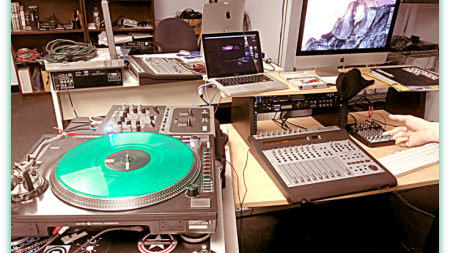
There is no denying that technology continues to significantly influence the music industry these days. People have grown comfortable integrating modern technology into their daily lives and the ways they listen to music are not immune to these advancements.
One of the biggest changes the music industry has seen is that for the first time ever, music’s elements (the visual and the acoustic) have been separated and are no longer necessary as a duo. It used to be that music was only seen live – hence the visual and audio aspects. But, with the advancement of audio engineering, the “…technology decoupled eye and ear”.
Now, music lovers are often left with just what they hear. And while this has spurred some of the best audio and sound engineering schools in the country to burst with students excited about the technological changes in this evolving industry, many musicians are left worrying that technology will essentially replace them.
However, as we take a deeper look at how technology has intertwined into the music industry, you will see that while some things are still working themselves out, the truth is that digital technology is actually being hailed as the savior of the music industry, rather than the destroyer.
A Changing Industry
Over the last fifty years, the use of computers to generate sound has evolved into what is today’s popular mainstream music. Format, mediums, performance, and distribution of music has forced those in the music industry to follow this rising trend and either adapt or die out.
These new developments in how audio is manipulated are not the only ones the music industry has seen. In fact, the changes that come with digital technology reach far beyond audio recording.
Everything has changed.
Audio production has evolved, independent artists not bound to major record labels are on a more level playing field, and even the way the consumer listens to and purchases music have changed with the times.
A Trying Time
When digital downloading hit the market the music industry went into a virtual tailspin. As record sales plummeted due to easily accessible pirated music (provided thanks to online music services such as Napster), no one knew what to do.
At first glance, it seemed as though technology was dismantling the music industry and there was seemingly no recovery in sight. Consumers were getting what they wanted without spending their hard-earned money. And to top it off, they could customize what they downloaded, getting only the music they wanted, as opposed to having to purchase an entire album for one favorite song title.
Meanwhile, the country’s traditional music industry and all retailers tied to it suffered as a result:
- The United States lost $12.5 billion a year in total sales due to pirated music.
- 71,060 jobs were lost.
- U.S. workers lost approximately $2.7 billion in annual earnings; $1.1 billion of that would have been earned by employees in the music industry itself.
- The United States also lost $422 million a year in tax revenue.
Major record labels faced a major dilemma. Ordinarily in complete control, they had to either relinquish power to the consumer, who now was in control, or lose everything and fade away. And as any successful business owner will tell you, giving in to what the customer wants is the only way to stay ahead.
In fact, as companies such as BMG Rights Management and Kobalt began offering record label services without demanding rights to the music, the major players in the record label industry were forced to rethink their existing business models.
As a result, some musicians had become empowered by the advancements in technology and had changed the playing field forever.
Lost Money
As the music industry gained more control over pirated music and internet streaming became the norm, artists and their record labels made sure everyone knew they were still not happy with the changes technology had encouraged.
Everyone wants to be paid for his or her work. And musicians are no different, no matter how much money they make annually. As musicians protested the online streaming of their music without what they considered “fair compensation,” consumers resisted and made it clear what they wanted.
In the end, most musicians gave in to the fact that online streaming technology is what the future entails, and though more difficult than the old-fashioned way, there is still plenty of money to be made by streaming their music.
That is not to say that those in the music industry are going unprotected, however, and that the consumers have the right to access music for free no matter what. In fact, organizations such as the Featured Artists Coalition (FAC) have been organized to protect artists in the music industry.
Better Fan Connections
That being said, technology has not brought heartache to everyone involved. Online streaming services such as Spotify, Pandora, and MixRadio have boomed since the normalcy of smartphones and tablets.
Plus, better fan connections have been forged with online streaming. Fans and artists connect, fans and brands connect, and even fans and fans connect.
Algorithms have been developed by those who have taken in-depth audio engineering courses to study users’ musical tastes and deliver customized music to them on demand. This personalization based on things such as listening preferences, gender, age, and location all play a role in what music is delivered.
The great thing is that users can also make their own customizations when it comes to what they hear online. Though custom playlists are recommended to them via complex algorithms, users are not prevented from stepping out of their bubble, connecting with new artists and fans, and developing a new taste in music. This simply adds to the appeal that technology is good for the music industry and satisfies customers now more than ever.
No Change in Composition Technique
The truth is, though technology has seemingly “taken over” the music industry, a lot of things still remain the same. Artists still record in traditional recording studios using real live instruments and backup singers. Audio and sound engineers are still needed to set up, record, and edit the final product to meet the demands of the consumer.
The only difference is that computers are enhancing the music to make it sound more like what consumers want these days. Expert audio engineers are taking old pieces of music and making them new. They are blurring the line between what is real and what is digital ‒ and customers love it. That is probably why digital technology is being hailed a hero to what was a slowly dying industry.
Final Thoughts
In the end, if music dies as an industry, it will be because the musicians let it. Once people realize that change is inevitable, and that progress is optional, everything will move forward a lot smoother.
Music isn’t dying, and neither is the art of sound and audio engineering. It is simply evolving and allowing for the creation of music in new and exciting ways.
The sooner everyone in the music industry embraces this, the more empowered they will feel to create something that has never been heard before ‒ and that will be something to be proud of.
If you are interested in stepping foot into this new and exciting industry of music technology and live in the Baltimore area, contact The Sheffield Institute for the Recording Arts. As one of the top audio and sound engineering schools in the country, Sheffield will have you prepared for the changing music industry in a way that brings nothing but success to you.



